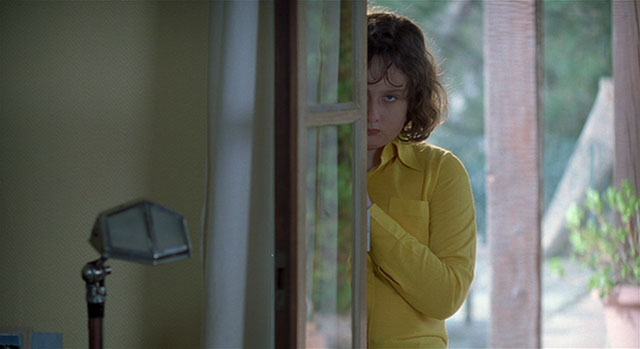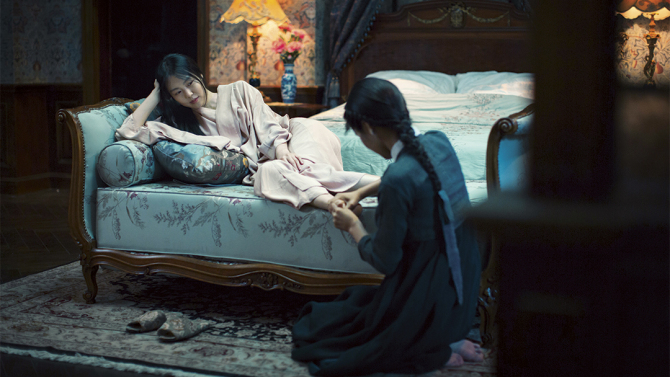14. It Felt Like Love (Eliza Hitman, 2013)

Lila (Gina Piersanti) is a fourteen-year-old girl trying to keep up with her more sexually experienced friend, Chiara (Giovanna Salimeni). She spends the summer pretending to be someone she is not in order to sleep with a college student named Sammy, putting herself through dangerous and humiliating situations.
A very promising debut film by Eliza Hitman, follows Lila into a world of confusion and loneliness many can relate to. Having lost her mother, her only sexual guidance is being the third wheel for her friend. Her naivety and simple desire for attention lead her to an awkward, cringe-worthy road of pursuing a man she can never have.
The film digs into the way girls are expected to be overly sexual in order to grab the attention of boys. Society teaches girls to behave like porn stars while simultaneously shames porn stars for what they do, creating a double-edged sword for young women everywhere. Hitman underlines masterfully the potential dangers this double standard hides. Lila is a victim to this mentality, putting herself in many dangerous situations instead of learning to safely explore her sexuality since she has no healthy reference point by the media.
13. Obvious Child (Gillian Robespierre, 2014)

Donna (Jenny Slate) is a young stand up comedian that is currently going through a bad break-up. In an attempt to move forward, she has a drunken one-night stand with a stranger named Max (Jake Lacy). Later Donna finds out she is pregnant and decides she wants an abortion so she schedules an appointment in the only date available, Valentine’s Day.
Dealing with a very sensitive matter, Gillian Robespierre manages to deliver a respectful, heartwarming and funny film. The character of Donna is not once shamed for her sexual life and choices. Her decision to have an abortion is solely hers and she is having more problems with telling Max and the world about her decision rather than with taking it in the first place.
Robespiere is opening the way for more directors to make films that destigmatize abortion and explore the relationship of young women with unplanned pregnancies and healthy sexual lifestyles. While avoiding going into propaganda territories, the film explains that whatever choice a woman makes on that subject is the right one and society must accept it.
12. Wetlands (David Wnendt, 2013)

Helen (Carla Juri) is a provocative eighteen-year-old girl determined to challenge every rule society has about female sexuality. One day, while shaving her anal hair, she cuts herself with the razor and has to go to the hospital. She finds this a great excuse to bring together her divorced parents, going into extreme ways to accomplish that.
Helen masturbates with vegetables, has her own rules about female hygiene and even makes her own tampons so she will not give in to the capitalist regime of marketing. Raw, vulgar and unapologetic, David Wnendt’s film has everything. It provides the heartfelt truth of adolescence and self-discovery with explicit images of sexual experimentation you will not forget soon.
Like every teenager, Helen feels lonely and unloved. It seems like all her doing is just a rebellious phase, a hormone-driven cry for attention and it probably is. The most important aspect of the film is that it explores the reasons Helen acts the way she does. Family is the main factor of a person’s formative experience. Helen’s personality and sexual identity were formed out of her family’s doing, the traumatic experiences of her past.
11. Fat Girl (Catherine Breillat, 2001)

During their summer vacation, thirteen-year-old Anaïs (Anaïs Reboux) and her fifteen-year-old sister Elena (Roxane Mesquida) meet a law student named Fernando (Libero De Rienzo), who immediately starts flirting with Elena. At night, Elena sneaks Fernando into their bedroom. Elena is scared to lose her virginity and after being pressured by Fernando she gives into a painful anal intercourse while Anaïs watches everything. A few days later, after Fernando has given her an engagement ring Elena loses her virginity to him. When her mother finds out she decides to drive the girls back home. At a rest stop an axeman kills Elena and the mother and rapes Anaïs.
This is a very unconventional, raw film, the kind that Catherine Breillat is known for. As absurd as the synopsis seem, the film contains many scenes a (female) viewer can relate to. Body issues, sibling rivalry, sexual awakening. Elena is being manipulated by Fernando to lose her virginity, a very familiar theme of this list.
In the first scene, the sisters argue with Anaïs believing it is better to lose your virginity with a stranger and get it over with while Elene insists it should be done with someone who loves you. Once again virginity is represented as a rite of passage, something that must be done in order for a woman to continue her life. What changes now is that Catherine Breillat manages to belittle society’s rule with that shocking, provocative ending.
10. Mademoiselle (Tony Richardson, 1966)

Mademoiselle (Jeanne Moreau) is causing irreparable damages to the little French village she lives in by setting fires, starting floodgates and poisoning the farm animals. The villagers never suspect that she’s behind all this and instead blame an Italian woodcutter, Manou (Ettore Manni), out of prejudice. Mademoiselle is sexually attracted to Manou and finally spends a night in the forest with him. When he tells her he’s going to leave the village, out of jealousy she accuses him of rape and the villagers beat him to death.
Keeping the dark, erotic atmosphere of Jean Genet’s original story, the film dives into the abyss of sexual perversion. The character of Mademoiselle is one of the few female characters with so many catastrophic tendencies linked to her sexual awakening. Mademoiselle is a vixen, a dangerous woman that will sacrifice anything on the altar of her sexual desire.
After seeing Manou trying to save a man from a fire, Mademoiselle becomes sexually attracted to him. Obsessively she starts causing various damages only to watch him save the day. From the start of the film it is made clear that she is not interested in fertility or motherhood. She is hunting only pure sexual pleasure. Her repressed sadomasochistic tendencies see the light of day when she plans her disasters, but she manages to always remain in control. She achieved her goal and now she will move forward.
9. Jamón, Jamón (Bigas Luna, 1992)

Silvia (Penélope Cruz) works at a factory that makes male underwear. She is in a relationship with José Luis (Jordi Mollà), the son of the factory owners, and ultimately gets pregnant. José Luis proposes to her, but his mother, Conchita (Stefania Sandrelli), disapproves of her son marrying a working class girl.
She pays part-time underwear model Raúl (Javier Bardem) to seduce Silvia away from her son, but later regrets it as she falls in love with him. Raúl and Silvia start a relationship and José Luis seeks comfort in Silvia’s mother, Carmen (Anna Galiena), who is a prostitute. When José Luis finds Raúl with his mother the two men fight and Raúl kills José Luis.
The women of Jamón, jamón experience various and different situations regarding their sexuality in relation with their class and place in society. Silvia has learned from her mother that her sexuality can be a weapon, but she has been shamed for it by society and the men in her life and is looking for a man to protect her. Carmen finds empowerment in hers, but she also has suffered a lot because of it.
Conchita finds a way to leave her upper class vanilla life behind her by getting into an affair with Raúl but the only way she can do that is by bribing him with expensive stuff. All three women are badly scarred by their previous sexual experiences something noticeable in the last scene when Conchita goes to console to Raúl, Carmen runs to José Luis’ dead body crying and Silvia is being comforted by Conchita’s husband.
This erotic melodrama by Bigas Luna is very entertaining if you see it as it was meant to be, a satirical take on the Spanish culture. The soap-opera inspired storytelling falls into almost surrealistic paths as it tries to incorporate its characters into the Spanish landscape and themes like class, lust, and culture.
8. The Handmaiden (Park Chan-wook, 2016)

In Japanese occupied Korea, Count Fujiwara (Ha Jung-woo) plans to trick Lady Hideko (Kim Min-hee) into marrying him, commit her to an asylum and then steal her inheritance that is now being controlled by her strict uncle. To help him win Hideko’s trust he hires a poor pickpocket, Sook-hee (Kim Tae-ri) to become her maid promising her a great deal of money. In the process the two women fall in love and manage to run away.
Park chan-wook has proven himself in the past as a very talented director and this beautifully shot psychological thriller has an erotic tale we do not see very often. The director films and builds the sexual tension of the female characters with logic and respect.
Hideko manages to reclaim her sexuality after her uncle ”stole” it from her by having her read graphic erotic novels to an audience often in a rather humiliating way. Between the intrigues, the lies, the abuse these women get to develop a true, passionate, romance. These women leave their male-dominated world behind and move towards love and freedom.